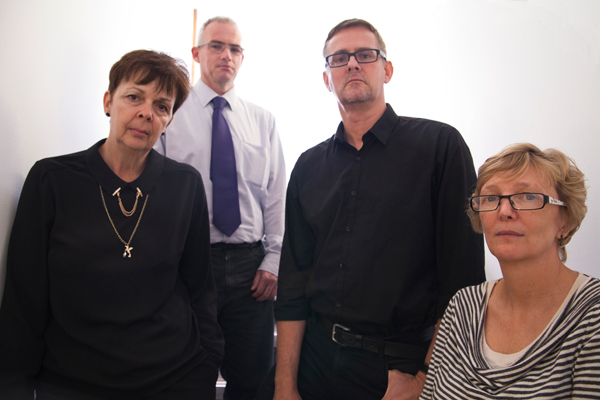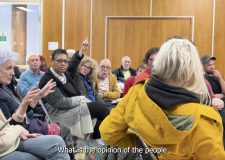Protecting the public
A Brighton TV company has shone a light on the little understood but much criticised work of probation officers. Frank le Duc reports

There are some criminals in Brighton and Hove who are particularly troubling to the Public Protection Team. Some they would even describe as scary. The team includes probation officers who are often criticised even though few people know what they really do. A Brighton documentary maker set out to find out. The result is being screened on BBC1 on Tuesday 5 February.
Emma Wakefield soon learnt that the Public Protection Team in Brighton has to manage 30 paedophiles. The team also routinely handles murderers, rapists and armed robbers. Their job includes managing offenders who have been released on licence from prison having committed serious and disturbing crimes. Few people would be surprised to learn that they need empathy. But they also need to be remarkably robust.
Emma, the executive producer of the documentary, Out Of Jail And On The Streets, said: “This is a ground-breaking film with unprecedented access to busy probation teams and the offenders they manage. We all know about criminals in prison. We know nothing about what happens when they come out. We have no idea about the way they are controlled, supervised and monitored. We know nothing about what it might take to change them. And we never see what it takes to keep us safe. Until now.
“This film uncovers all of that through the detailed work of officers at the Surrey and Sussex Probation Trust. Beyond the bars and locked gates of prison it’s hard to keep tabs on offenders. And back in the community, it’s often difficult for them to keep on track too. The probation officers in this film walk the tightrope of control, care and supervision of some of the most high-risk offenders.
“I shadowed some probation officers to see what they do to make sure we represented them properly. What we wanted to do was show the real life and work of probation officers. What people don’t understand is the rigour around their work. People have a perception that they just talk gently to offenders. It is very far from woolly. They are the most extraordinary people and rigorous to the nth degree.
“They protect the public from people that you would never want to meet really. And they do that with a calmness and a real care, from offender management to public protection. I have the utmost respect for them and what they do. Although it’s a one-off documentary, I think the subject merits a lot more.”
Inside views
One probation service insider said: “The trust, and the staff involved, took quite a brave decision to let the cameras in – the probation officers in particular, opening up their professionalism to public scrutiny. They did it because they believe passionately in the value of the job they do and wanted the public to see the real work of probation behind the tabloid headlines. It’s not very visual. We don’t lock people up or bash down doors. It’s complex and multi-layered.”
There was a belief though that showing it as it is would enable more people to gain a greater understanding of a much-criticised aspect of the criminal justice system. The documentary was filmed last year but it is being screened less than a month after the government proposed sweeping changes.
The professions most senior officers have spelt out doubts about those changes. They include allowing private companies to take on probation work. Similar changes have been seen in schools, medicine, policing and prisons. Plenty of people among the public as well as in the professions themselves have serious concerns about the impact of the profit motive on the way these services are provided.
In the documentary, Liz Carter, a probation officer and member of the Brighton Public Protection Team, said: “My world consists of murderers, rapists and armed robbers.” Another, Rick Bridger, said: “We work with very extremes of human behaviour – the most dangerous people in society.”
Vicki Brown, a probation officer and member of the Chichester Offender Management Team, said: “It’s a difficult balance. You’re an enforcer but you’re also helping them. If they’re before the courts again it’s not anyone’s failing but their own but yet there are all those issues there – you do want to help that person. The day I no longer believe in a person’s capacity to change is the day I hand in my notice.”
Emma Wakefield said: “These are extraordinary professionals who have dedicated their lives to the most troubling individuals – people most of us would give up on.” What drives them to do it? And how do they manage the daily challenge of controlling people at the extreme edge of society – those who are used to breaking rules and challenging authority? And who don’t like being told what to do?
This is what she and the crew from Brighton-based Lambent Productions set out to find out. The results can be seen on BB1 on Tuesday 5 February at 10.35pm.
Skilled Work
Linda Kelly
“Rewind this time last year and my collective experience of being in front of a film crew was limited to a brief appearance on TV at one of the early 24-hour fundraising telethons (pre Terry Wogan) and walking behind Rowan Atkinson in a filmed sketch around Carnaby Street. A long time ago and certainly pre-HD. Who said I was worried about HD?
“Fast-forward several months and all that has changed. Following much team discussion, soul searching and trepidation on our part, ably managed by our own leading man, senior probation officer Mark Burden, we found ourselves sharing our workspace and practice with a team of filmmakers from Lambent Productions.
“The enduringly effervescent Lambent producer Emma Wakefield persuaded us of her absolute commitment to showcase the work we do professionally and with integrity. I believed her but could not help harbour an unspoken fear that this might end up being an epitaph for the Probation Service, which
given the recent government announcements is a fear that has come back to haunt me.
“Director Ben Rumney and assistant producer Arthur, filmmakers extraordinaire, became integral to our working day over the long summer months that followed and I promise I remained 100 per cent professional and tolerant as I heard for what seemed like the millionth time that day, ‘would you just mind…’
“We became skilled at manoeuvring ourselves in and out of the microphone paraphernalia without too much loss of dignity and I will admit to only a few negative thoughts about what they could do with the camera as it was thrust in front of me yet again, particularly challenging in the middle of a recall. I think, all things considered, we maintained our sense of humour, film crew included, although we often had to dig deep to retrieve it.
“The pressure to ensure that I did not let anyone down weighed heavy at times. Would I do it all again? Absolutely. Who would not want the opportunity to showcase the frustratingly often-unseen work that as skilled and dedicated practitioners we do every day to ensure that the public remains protected?
“Did we achieve that aim? I will let you be the judge of that!”
Brighton & Hove City Council leader Jason Kitcat on public health
Forty years after it was transferred away to the NHS, the government is returning responsibility for public health back to local councils. As councils already have responsibility for so many areas that directly or indirectly affect people’s health, it makes huge sense to tie them together by regaining direct responsibility for public health.
For example, warm and dry homes can prevent heart and breathing problems in older and younger people. And supporting alternatives to private vehicles for residents to get around means less pollution in the air we breathe, and more people keeping healthy and active by walking and cycling. Better town planning means we can ensure more publicly accessible open space and facilities for people to keep fit.
More than ever before, we plan to involve public health in all these areas and others to make sure that council decisions clearly improve our residents’ health.
With the new powers and funding this public health responsibility brings, we can continue with the excellent work previously done by the NHS in areas such as mental health, physical activity and healthy weight among others.
One of the council’s priorities is to tackle inequality in the city, and public health is a key way to do that. ‘Health inequality’ is a phrase often used to describe how poor health is often linked to deprivation and other economic issues. Often it’s those that live in the most disadvantaged communities who experience the worst environments and the most health problems.
Our council has always worked closely with NHS partners, particularly in areas where there is an overlap. Now, with our partners, we will directly be able to play a much bigger role in improving our city’s health. We will rise to the challenge.




















